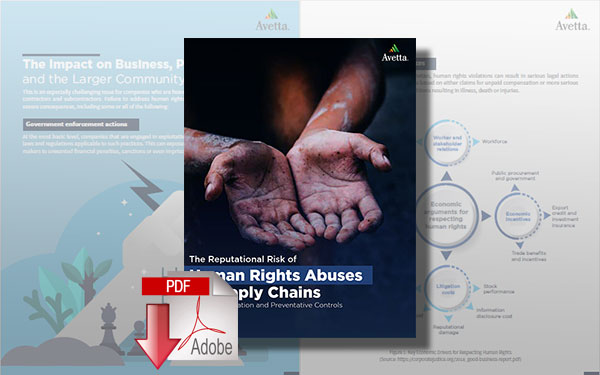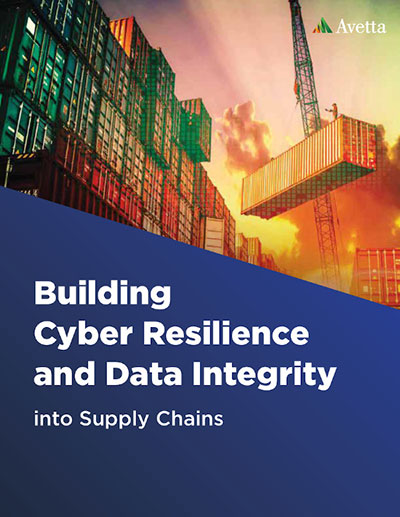The Reputational Risk of Human Rights Abuses in Supply Chains

Companies continue to be challenged by ever-changing risks, including operating in sectors that require goods and services to be sourced from a complex network of suppliers spanning across nations.
With access to new labor markets and emerging technologies, companies who span across country lines could be at risk of human rights abuses in supply chains.
Human rights abuses in the supply chain have been a longstanding global issue and can be difficult to monitor and mitigate.
According to a 2018 report from the UN’s International Labor Organization (ILO) and the Walk Free Foundation, nearly 40.3 million people are engaged in some form of modern slavery, with 71% of the victims being women and children.
Human rights risks in the global supply chain include:
- Forced or compulsory labor
- Human trafficking
- Bonded labor
- Restrictions on freedom of association and the right to collective bargaining
- Poor, unhygienic, or unsafe working conditions
- Illegal child labor
- Excessive working hours
- Harsh and inhumane treatment
- Discrimination
In most cases, human rights violations in the supply chain are due to poor management or exploitative practices. Research shows that 57% of businesses have poor visibility across their supply chains, and only 23% of businesses have a credible framework of mapping supplier networks—this is especially challenging for companies who rely heavily on third-party suppliers.
There are multiple ways you can manage human rights risks in your supply chain:
- Thoroughly Map Key Supply Chains: Companies should map their supply chains down to the level of product or raw material procurement. You need to know each individual’s certifications, insurance and trainings to ensure a strong supply chain.
- Risk Assessment of Contractors and Their Recruiting Practices: It’s critical for companies to thoroughly assess each supply chain partner and evaluate their recruiting and work practices to identify any potential forms of abuse or human rights violations.
- Autonomous Audits of all Labor Practices On-Site: A supplier’s compliance with a company’s labor policies and principles should be regularly evaluated through audits conducted by qualified and independent third parties.
- Effectively Manage Media Responsibilities: It’s important for companies to strategically manage their media responsibilities, which will ensure brand reputation does not get tarnished due to bad publicity or wrong whistleblowing.
- Leverage Social Media Listening to Identify Issues Early: Social media allows companies to obtain perspectives from people, employees, and customers. This is a prime opportunity for companies to stay vigilant of complaints, allegations, and grievances coming from the larger worker community and to mitigate labor incidents before they even grow out of proportion.
- Training and Educating Employees and Supply Chain Partners: Training for employees and third parties can help reduce risks as well. In these trainings, companies can clearly communicate their worker policies and guidelines to employees and suppliers.
Audit services, supplier prequalification and vetting software, and free risk assessments can help companies identify whether their suppliers are following the right labor policies and procedures, whether they are implementing the right workplace controls and complying with government sanctions on workplace rights.
Related White Paper
The Reputational Risk of Human Rights Abuses in Supply Chains
While geographically dispersed supply chains provide companies with access to new labor markets and emerging technology, they also present serious human rights risks that are difficult to monitor and mitigate. Download Now!
Article Topics
Avetta News & Resources
Compliance Risk: A Significant Impediment to the Modern Supply Chain Protecting Supply Chains Against Economic Uncertainty Supplier Classification: A Differentiator in the Modern Supply Chain Landscape New Cybersecurity Requirements Needed for Supply Chains Building End-to-End Risk Resiliency in Supply Chains Supply Chain 2030: Evolving Challenges, Opportunities and Technological Possibilities Extending ESG Best Practices Into the Supply Chain More AvettaLatest in Supply Chain
A Look at Baltimore’s Key Bridge Collapse—One Month Later European Parliament Passes New Law Requiring Supply Chain Accountability Baltimore Continues Bridge Recovery With Opening of New Channel How Shippers Can Prep for Hurricane Season Apple Accused of Multiple Human Rights Violations South Korea Finally Overtakes China in Goods Exported to U.S. UPS Struggles in First Quarter With Steep Earnings Decline More Supply Chain














